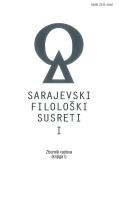HIBRIDNI OBLICI I VRSTE RIJEČI
HYBRID FORMS AND HYBRID WORD CLASSES
Author(s): Ivo PranjkovićSubject(s): Syntax, Semantics, Pragmatics, South Slavic Languages
Published by: Bosansko filološko društvo
Keywords: hybridisation (categorical and functional); word forms; word classes; nominalization; adjectivalisation; adverbialisation; prepositionalisation; conjunctiation; particulation;
Summary/Abstract: The paper focuses on how different word classes come into contact and/or are confronted, which results in various kinds of hybridisation of both individual words and of word classes they belong to. Two basic types of hybridisation can be distinguished: categorical and functional. The former occurs on the level of form or word and the latter on the syntactic level. Categorical hybridisation is characterised by hybrids composed of verbs and other word classes (verbal adjectives, verbal adverbs and verbal nouns) and the fact that some word classes, foremostly pronouns and numbers can be classified into nominal, adjectival and adverbial classes. Functional hybridisation is characterised by the fact that words occur in larger syntactic units that are not typical for them and this results in nominalisation of adjectives, adjectivalisation and adverbialisation of nouns, prepositionalisation of adverbs, adverbialisation of prepositions, subjunctivisation of pronouns and particles, particulation of conjuncts, etc.
Journal: Sarajevski filološki susreti: zbornik radova
- Issue Year: 1/2012
- Issue No: 1
- Page Range: 191-199
- Page Count: 9
- Language: Croatian

